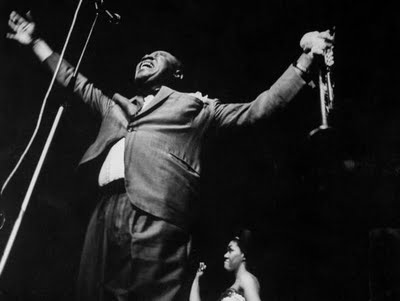Pops: A Life of Louis Armstrong was featured today on ABC’s Good Morning America as one of the best holiday books of 2009. Among the other titles mentioned were Teddy Kennedy’s True Compass, Andre Agassi’s Open, Stephen King’s Under the Dome, and Dean Koontz’s Breathless–unusual company for me!
To read the complete list, go here.
Archives for December 21, 2009
TT: Off the road
 Mrs. T and I finally made it to Smalltown, U.S.A., in one piece last Friday night. Since then we’ve been watching the weather in New York on TV and doing as little as possible (though I’m talking to the BBC by phone later today and still have a couple of pieces to write between now and Christmas).
Mrs. T and I finally made it to Smalltown, U.S.A., in one piece last Friday night. Since then we’ve been watching the weather in New York on TV and doing as little as possible (though I’m talking to the BBC by phone later today and still have a couple of pieces to write between now and Christmas).
I feel as though I’ve been on the go without a break for most of 2009, which isn’t so far from the truth. I’ve been so busy that I’m having trouble relaxing: I can’t seem to switch off my Oh-God-What-Now-O-Meter. Fortunately, Smalltown has no chain bookstores, TV stations, or lecture series to lure me back down the road of excess. All I really have to do is kick back, hang out, and sleep late. I plan to read a couple of new books, watch a little TV, and open my presents on Friday morning. That ought to do me very nicely.
I’ll blog a bit this week, including the usual daily postings, but nothing too strenuous. I think I’ve earned a break, and Mrs. T and my mother agree. In case you’re wondering and/or worried, they’re taking very good care of their weary boy.
Enjoy the week. I know I will.
TT: The continuing adventures of Pops
 Favorable notices of Pops: A Life of Louis Armstrong are now appearing in such quantity that I’ve stopped trying to keep up with them. I did, however, take special note of Louis Bayard’s review in the Washington Post:
Favorable notices of Pops: A Life of Louis Armstrong are now appearing in such quantity that I’ve stopped trying to keep up with them. I did, however, take special note of Louis Bayard’s review in the Washington Post:
Maybe we need a half-century’s distance to see this gifted man without the filter of politics, to regard his grin not as an accommodation to the white world but as the distillation of his soul. In the end, true goodness may be the hardest quality to pin down, or to accept, in art, but that is what Armstrong’s music abounds in, even at its most commercial. He was, in Teachout’s lovely phrase, “a major-key artist,” whose “lavish generosity of spirit was part and parcel of his prodigal way of making music.” That prodigality is our gift, and Louis Armstrong, I am happy to report, is still grinning at us. Upon finishing this definitive life, the reader is instructed to flip to the discography, download every last song, listen and grin the hell back.
I was no less pleased by a review in the Seattle Times that made an equally important, insufficiently mentioned point about Pops:
To state the obvious: Louis “Satchmo” Armstrong had a seminal role in the development of jazz. Wall Street Journal critic Teachout makes that case anew in this sympathetic, musically astute bio–but with none of the grinding axes marring some recent biographies of a revered trumpeter-singer called “Pops” by his fellow players.
I’ve also done a couple of dozen radio interviews about Pops in the past couple of weeks, with still more to come between now and the end of January. Two that I especially liked were aired by KUSC, the station of the University of Southern California, and WILL, the station of the University of Illinois at Urbana-Champaign. Both are now available on line, and you can listen to them by going here and here.
More anon!
TT: The end of trend
In today’s Wall Street Journal, several of the paper’s columnists were asked to sum up and reflect on developments in their fields of interest during the first decade of the twenty-first century. Art and culture being my beat, I wrote what may seem at first glance like a paradoxical-sounding piece about the absence of trends in the ’00s:
The most significant cultural development of the first decade of the 21st century was…iTunes. Or the Kindle. Or YouTube. Or blogging. Or Amazon’s customer reviews. Take your pick–but whatever you choose, don’t make it a work of creative art. Yes, important art continued to be created in the new millennium, but the big culture-related news of the Decade Without a Name is that it will likely be remembered less for its art than for the inventions that put the art into circulation.
Every journalist who covers the world of art and culture is a trend-monger, always looking for the Next Big Thing like a pig snuffling for truffles. But never before has it been so difficult to point to any sharply defined stylistic tendencies in Western culture….
Read the whole thing here.
TT: Almanac
“To be happy at home is the ultimate result of all ambition, the end to which every enterprise and labor tends, and of which every desire prompts the prosecution.”
Samuel Johnson, The Rambler (Nov. 10, 1750)
